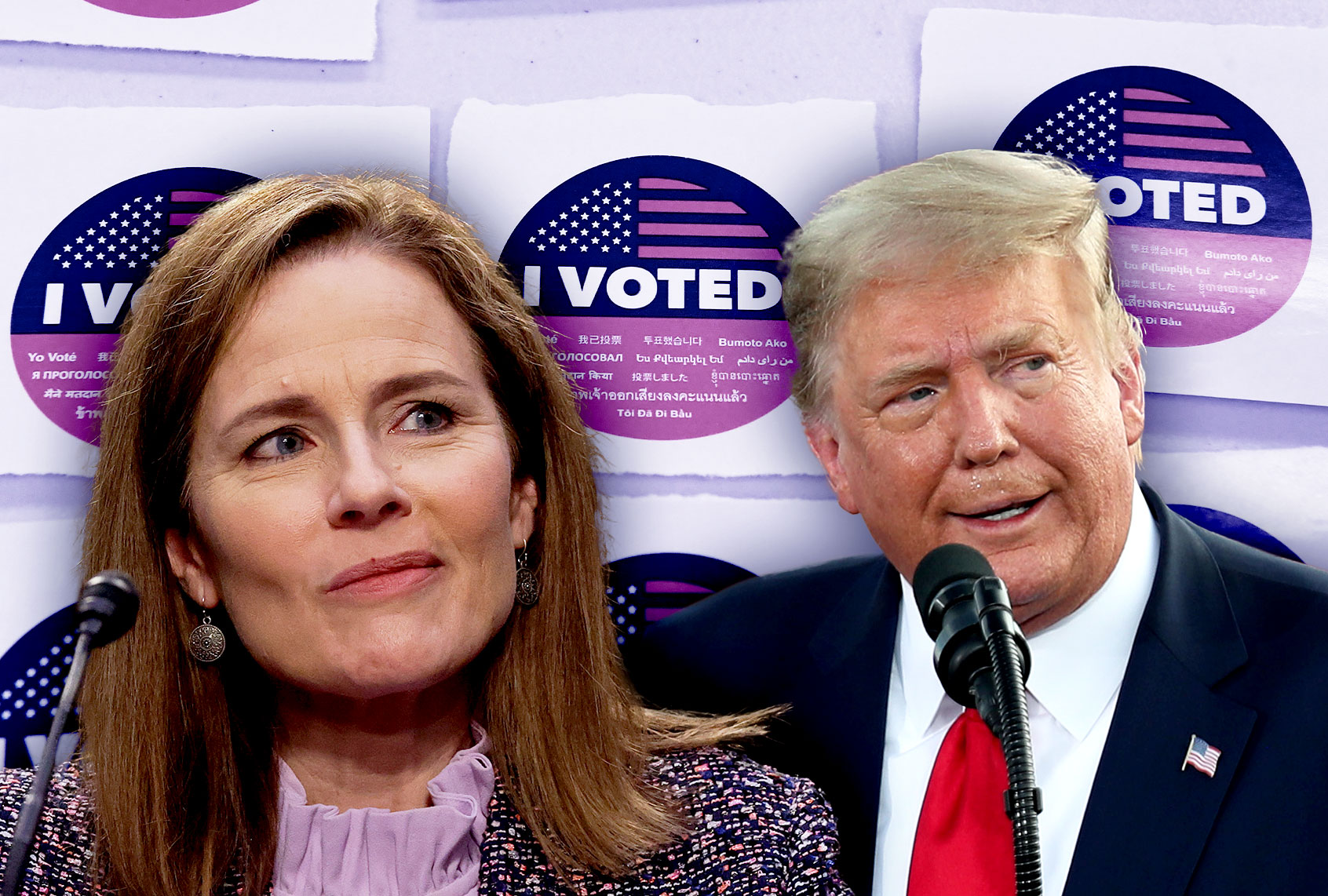While Amy Coney Barrett’s confirmation to the Supreme Court advanced to its all-but-certain conclusion last week, Pennsylvania Republicans pushed the high court to reconsider a case about voting by mail. Only days earlier, a split decision had dealt the attempt to restrict mail-in ballots with defeat.
If the court agrees to rehear the case, Barrett, who refused to answer questions during her confirmation hearings about whether laws enshrining voter intimidation were against the Constitution and whether the president had the authority to unilaterally delay the election, would see her voting views tested out of the gate.
Combined with the controversial timing and speed of her confirmation, such a move would undoubtedly raise questions about whether Republicans rushed to stack the court with favorable justices ahead of the election. In fact, some have already answered in the affirmative.
Earlier this month, Pennsylvania Republicans appealed a state court ruling declaring that mail-in ballots received within three days of Election Day should still be counted — even if they do not have a postmark. Barrett’s future colleagues on the high court blocked that Republican effort to curtail the vote in a split 4-4 decision, with Chief Justice John Roberts joining the court’s three liberals.
The outcome set the table for the Trump appointee to cast the pivotal vote upon a potential second appeal, and experts quickly sounded the alarm that the ruling might be immediately challenged if Barrett assumed the bench.
The state’s “victory may only last a matter of days,” Vox reporter Ian Millhiser wrote at the time. “Indeed, the GOP may be able to raise this issue again after Barrett is confirmed, potentially securing a court order requiring states like Pennsylvania to toss out an unknown number of ballots that arrive after Election Day. If the election is close, that could be enough to change the result.”
Experts doubt the court will hear the case again for a few reasons, one of which is the proximity to Nov. 3. Moreover, Barrett’s recent confirmation in an election year — after Republicans refused to weigh Merrick Garland’s nomination by former President Barack Obama in 2016 — would be certain to invite questions about the politicization of the court.
“It’s possible that Republicans can renew their application if and when Judge Barrett is confirmed, in the hopes that she’d side with them,” Steve Vladeck, a law professor at the University of Texas, wrote after the initial ruling. “That said, that close to the election, it’s hard to imagine that all four of tonight’s dissenters would want to upset the status quo.”
Election law expert Rick Hasen pointed out the timing issues in a recent interview with CNN.
“People have been conducting themselves under the belief that as long as ballots are postmarked by Election Day, they’re going to be accepted,” Hasen said.
“Voters knew there was a dispute over what the timing was, and the Supreme Court declined to get involved,” he added. “So for the court to get involved now after voters relied on it would be really tough.”
The number of early votes has far surpassed past 2016 levels. Americans had cast more than 67 million ballots as of Tuesday, compared to just north of 47 million total early votes four years ago, according to national statistics compiled by the U.S. Elections Project at the University of Florida.
While a number of election law cases continue to percolate in the courts, the most paramount were decided earlier this year. Among them was Monday’s 5-3 Supreme Court decision striking down a Wisconsin court order to extend ballot receipt deadlines. Even if postmarks show they were mailed ahead of time, mail-in ballots in that state cannot count unless they are physically received on or before Election Day, the court ruled.
Writing for the majority, Justice Brett Kavanaugh, a Trump appointee, issued what was criticized as a “red alert” interpretation of the law. He argued that the “longer after Election Day any significant changes in vote totals take place, the greater the risk that the losing side will cry that the election has been stolen,” a calculation which seemingly prizes speed over accuracy ahead of the most contentious U.S. election in modern memory.
In her dissent, Justice Elena Kagan, an Obama appointee, quoted the late Justice Ruth Bader Ginsburg as she argued the ruling meant Wisconsin voters must choose between “braving the polls with all the risk that entails and losing their right to vote.”
That decision came down Monday evening, minutes before the Senate confirmed Barrett. Kavanaugh’s argument appeared to align with Trump’s remarks about what he considered to be legitimate votes, including a tweet which was partially censored by Twitter on the same day for breaking the social media platform’s rules about election misinformation.
“Big problems and discrepancies with Mail In Ballots all over the USA,” Trump claimed. “Must have final total on November 3rd.”
In addition to the Pennsylvania ruling, other Republican legal efforts have been rejected, such as a previous suit to stop Nevada from mailing ballots to every registered voter in the state.
Some legal issues remain pending, however, including cases surrounding in-person voting. For instance, a Michigan lawsuit aims to block Secretary of State Jocelyn Benson’s order to ban the open-carry of firearms within 100 feet of polling places.
Observers also expect a number of ballot-counting lawsuits to be filed after the election, especially if the race is close in key swing states. Trump himself has said as much, telling a North Carolina crowd last month that he was “counting on the federal court system” to decide the contest on Election Day.
“We’re counting on the federal court system to make it so that we can actually have an evening where we know who wins, OK,” the president said at the time. “Not where the votes are going to be counted a week later, two weeks later.”

